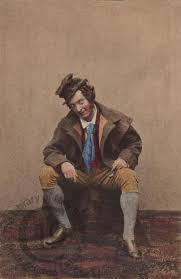When we write we put so much of ourselves into the work that personal philosophies often come shining through. It is possible to be smart and deliver those philosophies as if expounded by one or more of our characters. Charles Dickens uses Sam Weller in Pickwick Papers for that and other purposes.
Samuel Weller
Near the end of the story he waxes lyrical about post boys and donkeys.
Post Boys
When a public postal service was first introduced in 1635, letters were carried between 'posts' by mounted post-boys and delivered to the local postmaster. The postmaster would then take out the letters for his area and hand the rest to another post-boy to carry them on to the next 'post'.
The position of post boy was still an active roll in the 19th century and it was those people that Dickens was referring to in his story.
For example,
He remarks that you never see dead postboys or dead donkeys lying in the street. 'Vithout going so far as to assert donkeys and postboys are immortal... I'd say wenever they feels theirselves getting stiff and past their work, they just rides off together, wot becomes of 'em nobody knows.'
Sam Weller was so popular in the 19th century that he became part of everyday interactions rather like some of the sayings of Morecambe and Wise in the 20th century. 'It wasn't me that said that it was Sam Weller' was often used.
Finally, Pickwick comments on Sam -
The fact is he's my servant, but I allow him to take a good many liberties, for between ourselves, I flatter myself that he's an original, and I'm rather proud of him.
Which I feel is actually a comment from the author himself.
Happy New Year
God Bless






No comments:
Post a Comment